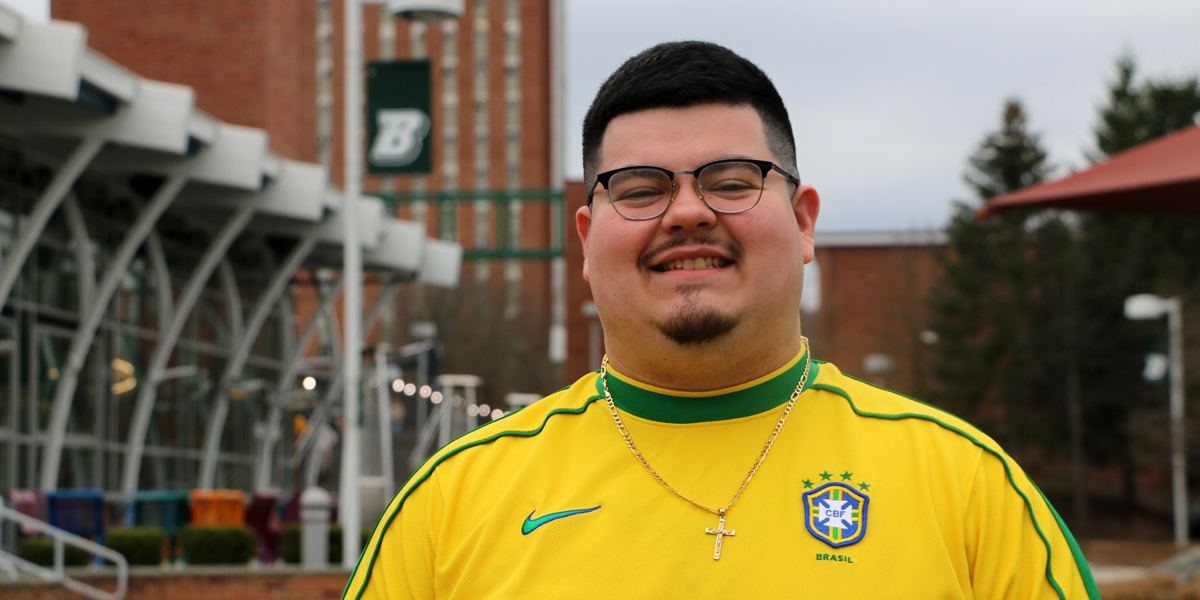How Binghamton helped one first-generation student discover his purpose
Pedro Alarcon’s journey from transfer student to mentor proves the power of personalized support and belonging

Pedro Alarcon’s first experience as a college student didn’t go as he planned. As a first-generation student — the son of immigrant parents — at a small, predominantly white school far from home, he felt isolated and unsupported and quickly changed his course. He returned home to Nyack, N.Y., and attended Rockland Community College, where he earned an associate degree in humanities. But he knew he wanted to achieve more.
In the fall of 2020, Alarcon transferred to Binghamton University, and immediately could tell that his time as a Bearcat would be different from his first college experience. The people he met made all the difference, ensuring he felt supported and a sense of belonging. He reached out to TRIO Student Support Services (SSS), a federally funded program that promotes academic success and personal growth for first-generation students, income-eligible students and students with disabilities at Binghamton University.
Marissa Zelman, associate director of student support services, was one of the first people Alarcon met, and he connected with her over shared experiences, forming a quick bond.
“Marissa was always checking up on me, not only about academics but also about my personal and mental well-being,” Alarcon said. “She truly cared, not only about me as a student, but me as a person — and that made a big difference.”
Alarcon also connected with Richie Sebuharara, his first SSS advisor at Binghamton. Sebuharara’s approachable demeanor and willingness to help left a lasting impression on Alarcon.
“Richie was always smiling and very supportive. He would always go out of his way to make me feel welcome,” Alarcon said. “He became like an older brother figure to me.”
During his time at Binghamton, Alarcon also spent a lot of hours at the Multicultural Resource Center (MRC). He recalled Ejiro Amata, the MRC office manager, setting the tone for students who entered the office, making an effort to provide a sense of belonging to every student.
“Ejiro was always there, making jokes and ensuring everyone felt welcome. The MRC was the first place I felt at home at Binghamton,” Alarcon said.
Through these relationships, Alarcon found not only academic guidance but also personal support that significantly impacted his college experience. As he progressed through his undergraduate career, he embraced opportunities to mentor others, becoming a TRIO mentor and eventually, as a graduate student in the Master of Social Work program, an academic counselor in the SSS office. These roles allowed Alarcon to give back to the community that had supported him and to help other first-generation students feel less alone and more confident in their college careers.
“I try to emulate the things that I valued most from those people,” Alarcon said. “Marissa was always checking on me as a person and I make sure to do that with each of the students I work with — check in with them personally. Richie was always willing to go above and beyond to help anyone, so I try to make sure to take that approach. And then Ejiro — he was just always so welcoming and made me feel like part of a family. That was something I always thought about as a TRIO mentor and even now, just making students know they’re welcome here.”
Reflecting on his journey, Alarcon offered advice for other first-generation college students.
“Doubts will always come, especially for first-generation college students, because we are the first ones to do it,” he said. “Although it may be scary, it’s a good thing because it pushes you to find resources and people that can help you excel.”
He also emphasized the importance of seeking out resources and support, especially in situations where students aren’t confident of their next steps.
“Even when you’re doubtful, that’s especially when you should be seeking those resources and people who can help you and push you in a positive way,” he encouraged.
In reflecting on his journey, Alarcon acknowledged the importance of the SSS program in shaping his college experience and future aspirations. He plans to graduate in May and hopes to continue helping future first-generation students overcome their challenges and achieve their goals.
“Being first-generation is a burden, but it’s also a blessing,” Alarcon said. “It shows that, despite the odds, we can excel and inspire others to do the same.”

